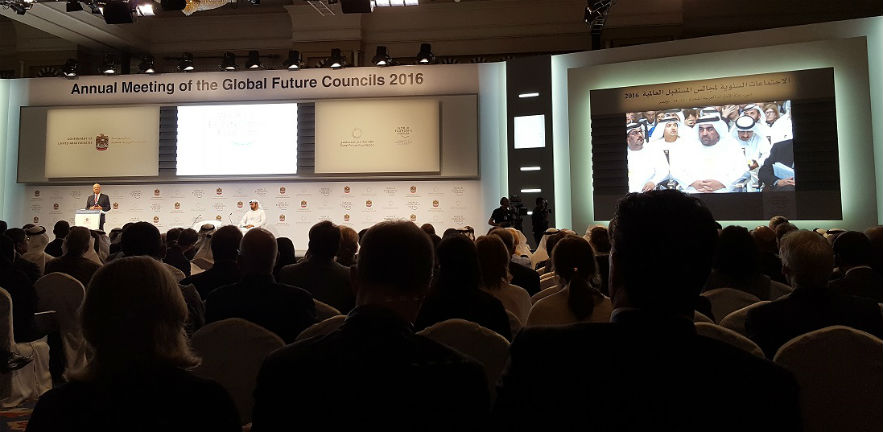On 13 November the World Economic Forum (WEF) convened the latest meeting of its Global Future Councils in the lavish settings of a Dubai beach-side resort, and I joined as a newly elected Global Future Council Fellow.


The Global Future Councils were created by the WEF to be “the world’s foremost interdisciplinary knowledge network dedicated to promoting innovative thinking on the future”—an assembly of mini think-tanks if you like, each tackling one of the 35 key issues the WEF sees as most influential to the world over the coming 10 to 15 years.
Joining me in Dubai, and on this foray into the not-too-distant future, were 700 of the most influential change makers and thought leaders on the globe, seconded from their various posts across the worlds of academia, politics, business and civil society, and from every continent. Our mission: “to challenge conventional thinking and develop new insights and perspectives on the key global systems, as well as the impact and governance of emerging technologies.”
The unfolding world context that frames this mission is what analysts are calling ‘the fourth industrial revolution’ (after the previous three: steam power, mass production, and electronics). Characteristic features of ‘the fourth industrial revolution’ include the emergence of intelligent machines, the rise of biology as a field of engineering, and a step-change in the rate of scientific discovery and invention. It’s hard to conceive of an aspect of human life that won’t be radically impacted by these concurrent phenomena. Fittingly therefore, the topics of the 35 councils are a broad church, spanning all industries, academic disciplines and social spheres.
My role as Fellow of the Council on the Future of Innovation & Entrepreneurship finds me sitting alongside 25 eminent innovators and entrepreneurs. Our two days of brainstorming in Dubai were to set the scene for the next two years’ work. While we’re still at the beginning of our journey, I can outline here some of the areas we agreed are most important regarding the future of innovation & entrepreneurship and some of the main questions to be answered:
Socially responsible innovation & entrepreneurship
How might we best promote innovation & entrepreneurship that serves society and environment?
How might we encourage (venture) capital to serve industry and geographic locales that yield the most social good (vs. merely yielding the greatest financial returns)?
Metrics for measuring socially responsible innovation & entrepreneurship
How might we best measure social impact?
To what extent are such metrics compatible with conventional business metrics and decision-making processes?
Innovation & entrepreneurship for jobs
With automation increasingly invading once safe employs, how might we encourage innovation & entrepreneurship that serves customers without harming employees?
Which forms of innovation and entrepreneurship create the most jobs, and which ones create the most meaningful jobs?
Policy recommendations
What form might policy take to ensure the changes inspired by innovation & entrepreneurship are beneficial?]
How might policy and law be designed to proactively react to, rather than lag behind, the rapidly advancing technologies in the world?
Of course, on many of these topics much ink has already been spilt—this partly owes to the fact that the questions posed uniformly admit of no simple answer. Regardless, the breadth of ambition for all Global Future Councils is clear: to shape the public narrative broadly as well as to inform and influence those decision-makers that hold sway specifically. No small task then, but with the council’s and the WEF’s combined resources at out disposal, we can justifiably aim to make a profound impact on this challenging topic, thereby living up to the WEF’s motto of ‘improving the state of the world’. Whether our output constitutes white papers, policy recommendations, industry reports—even blogs—what impact we can make will be our ultimate driver.
Happily, in a world of self-driving vehicles, regenerative medicines and billion-dollar start-up valuations, the focus of the WEF’s Council on Innovation & Entrepreneurship is not merely the creation of wealth or the invention of the next techie gizmo. We’d all be fool to forget that it is humans that innovation and entrepreneurship should serve, not the reciprocal. In Dubai this November, this council made a clear statement of the importance to work not just to make innovation & entrepreneurship better, but also to ensure they work better for everyone in society.
I look forward to providing more updates in the future. In the meantime, if you want to join in the dialogue, get in touch. I’d love to chat.


Leave a Reply